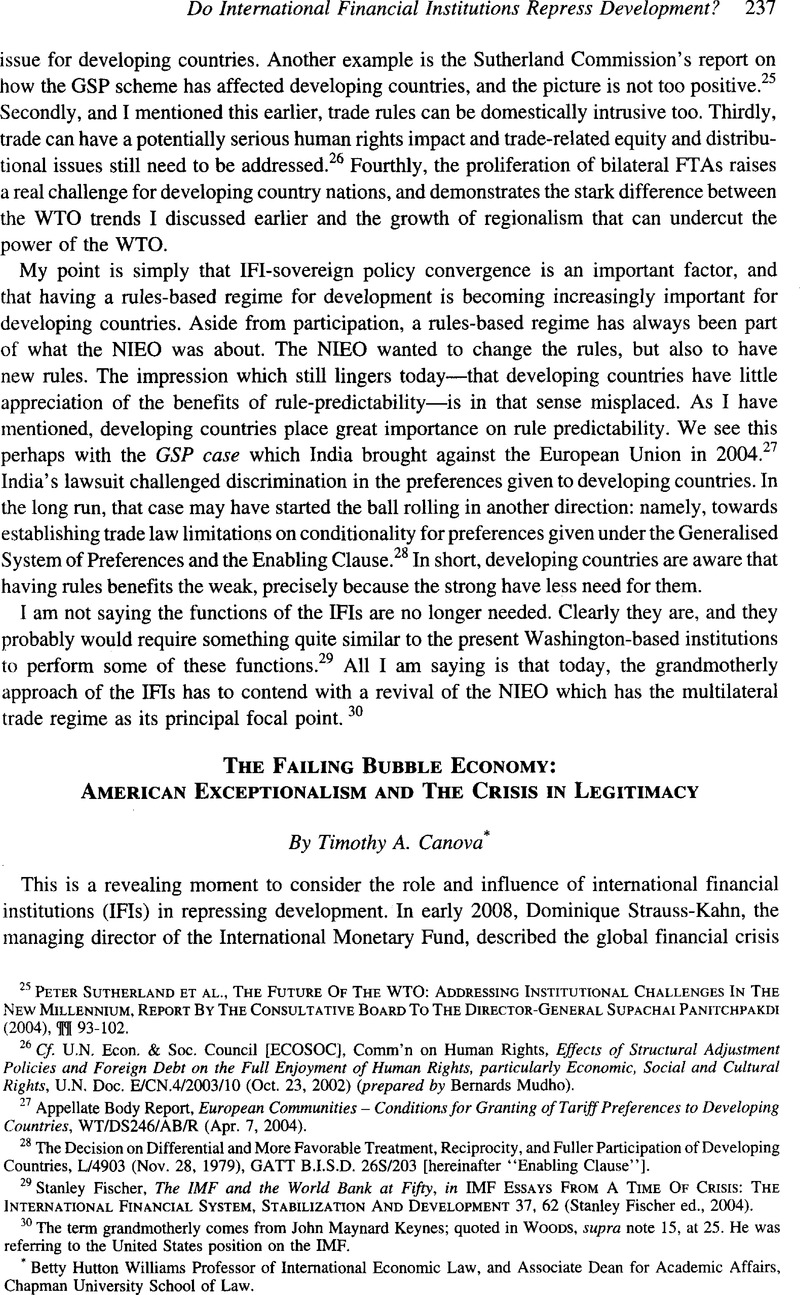Article contents
The Failing Bubble Economy: American Exceptionalism and the Crisis in Legitimacy
Published online by Cambridge University Press: 28 February 2017
Abstract

- Type
- Do International Financial Institutions Repress Development?
- Information
- Copyright
- Copyright © American Society of International Law 2008
References
1 The Fund is a bank that was designed to extend short-term credit for balance of payments support. The World Bank is a development fund, though one that extends aid in the form of loans at interest rather than outright grants that would require no repayment of principal or interest.
2 Gilbert, Geoffrey, International Clearing Union, in An Encyclopedia of Keynesian Economics 256-259 (Cate, Thomas ed., 1997)Google Scholar.
3 Howard Stein, Beyond the World Bank Agenda: An Institutional Approach to Development (2008).
4 Robert F. Kennedy challenges Gross Domestic Product, available at <http://www.youtube.com/watch?v=77IdK-FqXbUy>; Gross National Happiness and Development (K. Ura & K. Galay eds., 2004); Sulak Sivaraksa, Seeds of Peace: A Buddhist Vision for Renewing Society 35-43 (1992).
5 James K. Galbraith, The Predator State 83 (2008).
6 Leckow, Ross, The IMF and Crisis Prevention - the Legal Framework for Surveillance, XVII: 2 Kansas J. L. & Pub. Pol’y 285 (2008)Google Scholar.
7 Id. at 286.
8 Id. at 287-88.
9 Id. at 288.
10 Id. at 289.
11 Id.
12 The MTS purports to provide clear guidance on the stability of exchange rates by inventing a new concept of “external stability” as the central organizing principle of surveillance, which upon closer examination is not all that different from the old objective of “a stable system of exchange rates.” The new concept seems a lot like the old concept with new dressing and a new name.
13 Id. at 290-91.
14 Id. at 291-92.
15 Id. at 292.
16 Id. at 293.
17 Id. at 292-93.
18 Id. at 293.
19 Timothy A. Canova Legacy of the Clinton Bubble, Dissent 41 (Summer 2008).
20 The crisis in financial markets can be seen as a problem of sequencing reform, a failure to insure adequate prudential regulation and transparency prior to liberalizing capital accounts. Canova, Timothy A. Closing the Border and Opening the Door: Mobility, Adjustment, and the Sequencing of Reform, 5 Geo. J. Law & Pub. Pol’y 341, 348 (2007)Google Scholar.
21 Saskia Scholtes, Fannie and Freddie doubts grow, Fin. Times, Aug. 29, 2008 (reporting that the Bank of China announced “it had cut its portfolio of securities issued or guaranteed” by Fannie Mae and Freddie Mac by a quarter, or $4.6 billion, since the end of June. “The sale underscored signs of nervousness among foreign buyers of Fannie and Freddie debt.”).
22 Canova, supra note 19, at 394.
- 1
- Cited by




